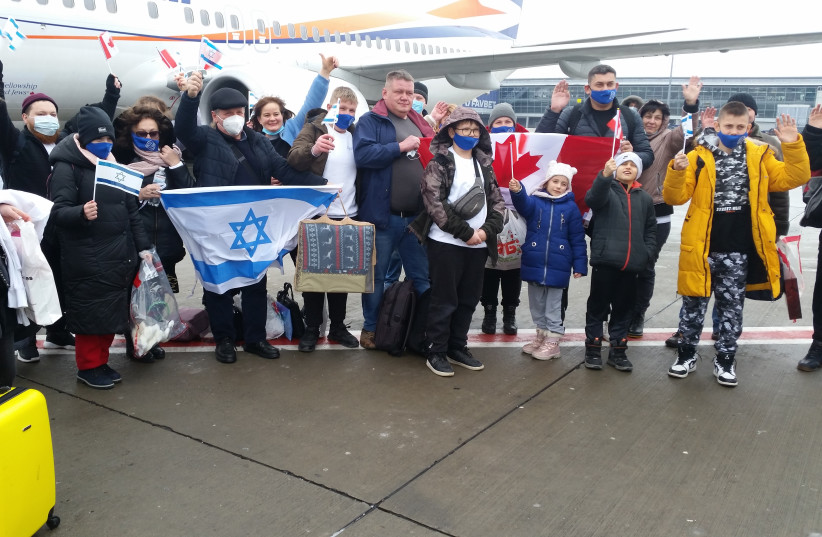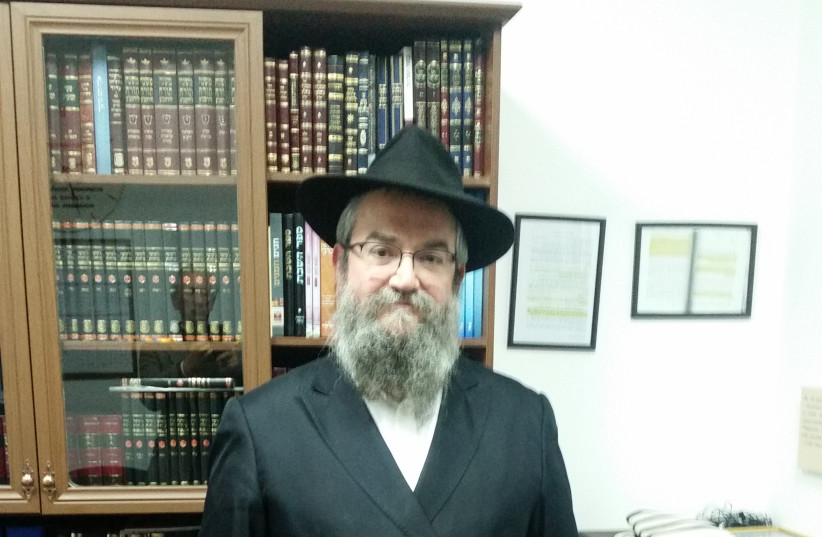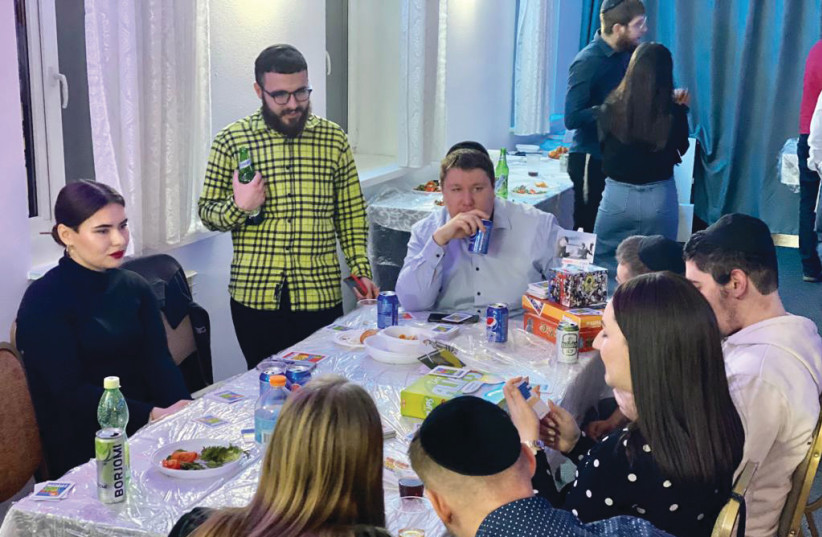Jews are often compared to the canary down the mine, whose death warns miners that the air has becomes toxic. Today, the delicate podsnejniki blossom serves as another metaphor for Jews. It never dies but hibernates underground in winter, and is the first flower to break through the melting snow to welcome the coming spring.
As Ukraine endures the birth pangs of its national revival, it is apt. Three out of four voters in the country elected a Jew as its president in the spring of 2019. Furthermore, Ukraine had a Jewish prime minister at the time. Hassidism, born in 18th century Ukraine, has sprouted around the country particularly in Uman, and hannukiot are erected in towns where a few Jews live. Jews, it seems, have never been more welcome in the land once better known for its pogroms.
 Learn how to buy your home in Israel with confidence
Learn how to buy your home in Israel with confidenceUp to 2.5 million Jews lived in Ukraine, the heartland of European Jewry, in 1941. When the Nazis invaded Russia in June of that year, they headed straight for Ukraine. A week after occupying Kyiv (then Kiev) they had murdered nearly 34,000 Jews in the ravine at Babyn Yar.
By war’s end, according to latest high estimates, 1.5 million had been murdered. Those who had fled east or served in the Red Army returned home for lack of choice, since emigration was not an option. There should have been up to a million survivors and their offspring when the Soviet Union collapsed in 1991.
Estimates of the Jewish population today vary wildly – between 50,000 and 360,000. Chabad goes with the higher number, expecting by their outreach to draw out hidden Jews as the Ukrainian spring turns warmer. Others which go with the lower figure, nevertheless estimate that more than 200,000 Ukrainian Jews, part Jews, spouses and children may be eligible to immigrate to Israel.

During the war many of the grandparents and great grandparents of Ukrainian Jews living today hid or burned internal Soviet passports identifying them as Jews. Like many others who had lost documents, they applied for new ones, registering their nationality as Russian or Ukrainian. For good measure they gave their post-war children Russian or Ukrainian names. Hiding their Jewish heritage was conveniently assisted by state suppression of religion.
<br>Enter the Fellowship of Christians and Jews
Rabbi Yechiel Eckstein, who established the International Fellowship of Christians and Jews in 1983, had been a young community rabbi in Chicago in the Eighties and undoubtedly knew that it was a center of evangelical activity.
In 1891 – exactly a century before the “evil empire” collapsed in 1991, and five years before Theodor Herzl published Der Judenstaat – Chicago evangelist William Blackstone sent a memorandum signed by hundreds of fellow believers to the White House, calling on the US to facilitate emigration of Jewish survivors of the Russian and Ukrainian pogroms, to their biblical homeland in Turkish Palestine.
In 1916, when Blackstone sent another memorandum to President Woodrow Wilson, it included Jewish signatures like that of Judge Louis Brandeis, who acknowledged that Christian Zionists encouraged his own conversion to Zionism. A year later, when Britain was driving Turks out of Palestine, it issued the famous Balfour Declaration with Wilson’s blessing.
However, under the Soviet regime, the expected Jewish emigration from Ukraine was blocked. When the borders opened 70 years later, the next step was a no-brainer for Evangelicals and for Eckstein.
The Fellowship took off. Hundreds of thousands of small contributors, almost entirely Christian, helped the IFCJ build up assets of more than $1.3 billion and an annual budget of some $130 million. For years Eckstein, who took Israeli citizenship in 2002, worked with the Jewish Agency, contributing more than twice as much as the government to its aliyah program.

Chabad and the IFCJ
In 1993, after the collapse of communism, Chabad Rabbi Pinhas Vishetsky was sent from Israel as a shaliah (emissary) to the Donbass region, an area many believe Russian President Putin is now preparing to invade. Vishetsky found that about 10,000 Jews in the town of Donetsk and its environs needed urgent community assistance.
In 2000, Chabad’s chief fund raiser in New York put Vishetsky in touch with Eckstein and the IFCJ, whose access to millions of devoted small Christian donors exceeded anything Chabad could offer. Eckstein visited Donetsk with Chabad’s Rabbi Duchman but did not interfere in Vishetsky’s community-building work except to provide finance.
From 2004, conflict between Ukrainian nationalists and pro-Russians began to turn bitter, and in 2014 the situation was still more grave when Eckstein arrived in Odessa in May that year to check out the situation himself. He was concerned that Jews would be targeted in the growing conflict between “orange” nationalists and “red” pro-Russians. “There’s going to be war,” he said.
“I told him antisemitism was not the problem,” Vishetsky recalled during a visit to his Kyiv community center. But Eckstein replied, “‘We Jews have to be prepared,’ and he put aside money for me in case we had to flee.”
In Odessa, Eckstein had seen the aftermath of the arson at the Trades Unions building fire following Russian annexation of Crimea, in which more than 35 pro-Russians had burned to death. He said he also saw a large Star of David on a wall and a Russian slogan beneath which read: “Death to the Jews.”
Eckstein’s observation, like Herzl’s response to the Paris mob’s cry of “traitor” during the Dreyfus affair, could mean only one thing: aliyah. The canary was down the mine. It wasn’t yet dead, but it wasn’t singing.

IFCJ’s local representatives
Three young women represent the IFCJ in Kyiv, Kharkiv and Odessa, the main centers of Ukrainian Jewry today, as in pre-Soviet times. Said Nina Anisomov of Odessa, “Many people still hide their Jewishness.” Valeria Kolchik, from Kharkiv, remarked that “We all operate under a magnifying glass.”
Elvira Kreimer in Kyiv, says she personally experienced anti-Jewishness at school when students mocked her Jewish name and her black curly hair. Zhid (Jew) and Zhidovska (Jewish) were not uncommon epithets. But that was a few years back. Times have changed. “Today,” she said, “they would only make such remarks behind your back.”
Vishetsky recalled, “we established an escape plan” to move the Donetsk community westward until things calmed down. “Most agreed to leave and Rabbi Eckstein’s was the only one ready to help in this situation.”
But as the short-term solution he planned for stretched into winter, Eckstein suggested emigration to Israel. “I had never dealt with aliyah; my job was to work with communities where they were,” Vishetsky said.
In December 2014, the IFCJ sponsored its first independent flights of Ukrainian Jews to Israel, many of them from Vishetsky’s community. The airlifts have continued at least once a month for seven years. Before and after each flight, sweatshirts, flags and placards provided by IFCJ staff broadcast the immigrants’ appreciation to the IFCJ, which has brought them home to Israel.
<br>Eckstein’s Dream of Jewish-Christian Dialogue
A year after founding the IFCJ, Eckstein published What Christians Should Know about Jews and Judaism, which initiated a much needed Jewish-Christian dialogue which to many Orthodox Jews seemed pointless.
But Eckstein knew that Evangelicals foreswore antisemitism because they believed Jews were destined to fulfil biblical prophecy by returning to their land. It was a win-win situation in which both sides could justify their own faiths by nurturing a strong Israel.
Some rabbis thought his orthodoxy was slightly off-center. But when Vishetsky saw Eckstein in action he became his convert.
The IFCJ’s current success in airlifting former Soviet Jews, their spouses and children, all stamped by the local Israeli consuls as legitimate immigrants, is unrivaled. His daughter and successor, Yael Eckstein- her father passed away in 2019 - says the IFCJ has brought 750,000 olim on “freedom flights from 30 countries at a cost of NIS 800 million.”
Aliyah from North America is the preserve of Nefesh b’Nefesh – but anywhere else, (except Ethiopia), where Jews face antisemitism, poverty or both, the IFCJ reigns.
<br>Who are the New Olim?
For the post-World War II generation, the wake-up call to their Jewish identity came in 1967 through the Six Day War, which launched the Soviet refusenik movement. But to those born in the Eighties, to post World War II parents who might not have known they were Jews, the struggle of refuseniks was not history; it was not known.
In their Soviet-built high-rise on the outskirts of Kyiv, the Kuratniks – Pavel, 42; Natalia, 43; and their two children Danya, 13; and Sonya, 7, were about to depart the land of their birth.
Pavel said that with the death of his great-grandmother, who survived the war, the family was disconnected from anything Jewish. His father was a career military officer. Pavel graduated from Kyiv National Economic University and moved into data analysis, worked for an American firm, and plans to continue working for the same company remotely in Israel. He was motivated by Israel’s hi-tech reputation.
Pavel and Natalia learned of IFCJ from the local Israeli consul, and consulted the organization’s Facebook page. Apart from packed bags, a calendar on the wall allowed Sonya to count the days to their departure. A homemade cardboard dreidel and hanukkiah hung on a door.
Pavel was asked at work if he was fleeing the conflict. He said no. Natalia had been learning Hebrew for years and the couple had visited Israel three times since 2011.“We felt at home there, like we came home again.”
Natalia believed that her work with children-at-risk would earn more respect in Israel than in Ukraine. Asked if 13-year-old Danya would have a formal bar mitzvah, Pavel thought a moment. “Coming to Israel will be his bar mitzvah.” Danya is more interested in studying robotics.
Pavel was not drawn to biblical prophecy, but to IFCJ’s Christian backers he was fulfilling it. He, like several other hi-tech immigrants I met through IFCJ Russian-speaking staffers Yael Branovsky and Gadi Teichman, gravitated toward Haifa, Nahariya, and Akko, cities close to hi-tech centers, where many Russian-speakers live as rent is cheaper than in Jerusalem and Tel Aviv.
A few days earlier, Pavel informed work colleagues he was leaving for Israel. None had known he was Jewish. He was amazed when three colleagues said they too were Jewish and had relatives in Israel. Three more podsnejniki blossoms had broken through the frosty tundra.
Alexandra Tymochenko, 39; her mother Lillia, 66; and sons Mikhail, 13; and Boris, 10, lived in similar circumstances. Alexandra never hid her Jewish identity and studied economics and Jewish courses at Solomon International University, founded in Kyiv under Prof. Alexander Teitelbaum, in 1992, and funded by Israel, the US and Germany.
Her ex-husband (whose surname was also that of a former Ukraine president) authorized her emigration with the children. Alexandra became a project manager in a Ukrainian IT company and said she never suffered from antisemitism. At least, school friends never “made bad jokes about Jews in my presence.” Lillia, her mother, however, recalled that she once caught roommates at her technical school rummaging for identity documents that would “incriminate” her.
One great-grandmother, on her mother’s side, had been religiously observant and was murdered at Babyn Yar with her whole family, while a great-grandfather fought his way into Berlin as a captain in the Red Army. He suffered shell shock and chaired a Jewish kholhoz (collective farm) after the war. Her father, like his grandfather, also a career communications officer, immigrated to Eilat in 1996. While visiting him she and her mother grew to love Israel.
Alexandra’s aliyah, however, was chiefly motivated by a hope that her son Mikhail, on the autism spectrum, would receive better treatment than in Ukraine where he was bullied at school. She had learned, and Mikhail approved, of an Israeli program to integrate young men on the spectrum into the IDF.
Natasha, a dentist, planned to renew her practice in Bat Yam, another hub of Russian-speakers. She spoke for many of her fellow passengers on IFCJ’s chartered flight when she said, “We don’t know much about Judaism, but we all believe in one God, and in Israel we will surely learn more.”
Waving Israeli flags, all expressed thanks for the help ICFJ had provided along the aliyah route. A reception by Immigrant and Absorption Minister Pnina Tamano-Shato was canceled due to corona fears.
The role of the IFCJ formally ends upon landing in Israel where every individual is given a one-time stipend of $500, to help them on their way. Yael Eckstein, who had “caught the vision” from her father, said that communication with grateful olim remains long after landing in Israel.
“I feel blessed… Last year we brought 5,000 olim… We give them the support they need to thrive in their new home. For thousands of years the biblical prophecy… seemed utterly impossible and now we are seeing the impossible become reality,” she said.
Just as important, Rabbi Eckstein believed he had helped to “change the 2,000-year history of Christian-Jewish relations” by turning Christians into what “I would say now are our greatest friends,” he told his official biographer Zev Chafets.
For the time being, his plan for a $60 million Fellowship Center in Jerusalem’s Talpiot neighborhood that Yael called “his baby” and would have been the concrete cornerstone of the IFCJ, has been put on hold.
Eckstein’s name in English translates as cornerstone, a highly symbolic image that has prophetic meaning in both Psalm 118 and the Gospels. Suspending work on the building does not mean financial problems, Yael Eckstein said, but rather a desire to concentrate on helping Jews in poverty and promoting aliyah, the true cornerstones of the IFCJ mission. ■
The writer was a guest of IFCJ. He is the author of Britain, the Bible and Balfour (Lexington Books, 2019), which explores the origins of Christian Zionism in 17th century England.
 Sign up for our newsletter to learn more
Sign up for our newsletter to learn more 